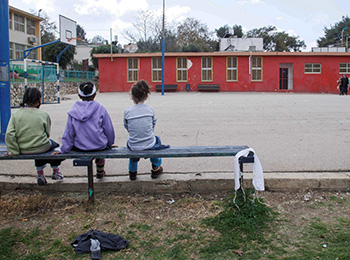A few years ago, while waiting by the elevator in our Tel Aviv apartment building, an Israeli neighbour nodded sagely at my Ethiopian Jewish daughter. “I’m so glad Judie finally got someone in to clean for her,” she said, nodding approvingly. Wuditu bobbed her head and shot me a quick grin.
“What country in Africa do you come from, dear,” the neighbour kindly inquired. A flicker of pain was quickly replaced by a pensive expression in Wuditu’s eyes. Knowing her penchant for irony, I thought, "oh boy, this is going to be good."
“Africa?” my daughter inquired, the very picture of innocent confusion. “Why, I can’t imagine why you’d think I’m from Africa. I’m from Russia,” she replied. That comment did the trick – our ride up to the ninth floor was from then on blessedly quiet.
But the questions never seem to end when a white mother strolls about with her two Ethiopian Jewish daughters. My favorite one of Wuditu’s retorts came after a lady on a bus walked over to us and asked, in Hebrew, “aich mekablim ka’eyleh?” Or, in English, “how do you get [girls] like them?” While I was trying to figure out how to answer the woman, Wuditu fired back: “Hurry, madam, because just for today, at the supermarket down the road, you can buy two of us for the price of one!”
In Wuditu’s case, the word "buy" was not inappropriate, because 23 years ago that’s just what I did: I bought Wuditu during a slave trade in a market town in northern Ethiopia. The transaction was cheap – $111.11. The child, when I found her, was emaciated and humbled to the point where she would bow down low whenever anyone looked at her. Clearly, this behaviour had been expected of a young captive.
So, imagine my pride as I watch Wuditu handling comments that range from the stupid to the downright malicious with a huge dollop of chutzpah and the poise of a standup comedian. In fact, I often can’t help kvelling as I watch the girls navigate their relations with Israelis with quiet, rapier-sharp humour. Still, these and less innocuous comments hurt them and it hurts me to watch it happening.
For most Ethiopian Jews, life in Israel is galling, frustrating and even, as we saw last week, dangerous. Over the years, Israeli media have covered several reports by Ethiopian youths who’ve been attacked and arrested by police officers for reasons as ridiculous as sitting on a park bench late at night. Also extensively covered are reports of Ethiopian Israelis routinely refused entry to nightclubs and of children prevented from registering for a local kindergarten or school. Not so long ago, a building’s residents even banded together to prevent the dreaded Ethiopians from buying or renting in their building.
It would be too much to expect all Ethiopian Israelis to have developed the kind of sang froid that Wuditu has so painstakingly acquired in response to unrelenting racist interactions. But, does justified anger warrant the kind of violent protest we saw in the last few days? Clearly not, and it’s a sad statement on their relations that the next generation of Ethiopians have come to believe that substantive change can only come after you raise your voice and, it seems, your fist.
Judie Oron is a Canadian/Israeli journalist and the author of Cry of the Giraffe: based on a True Story – the award-winning account of her daughter Wuditu’s experience as a slave in war-torn Ethiopia.
